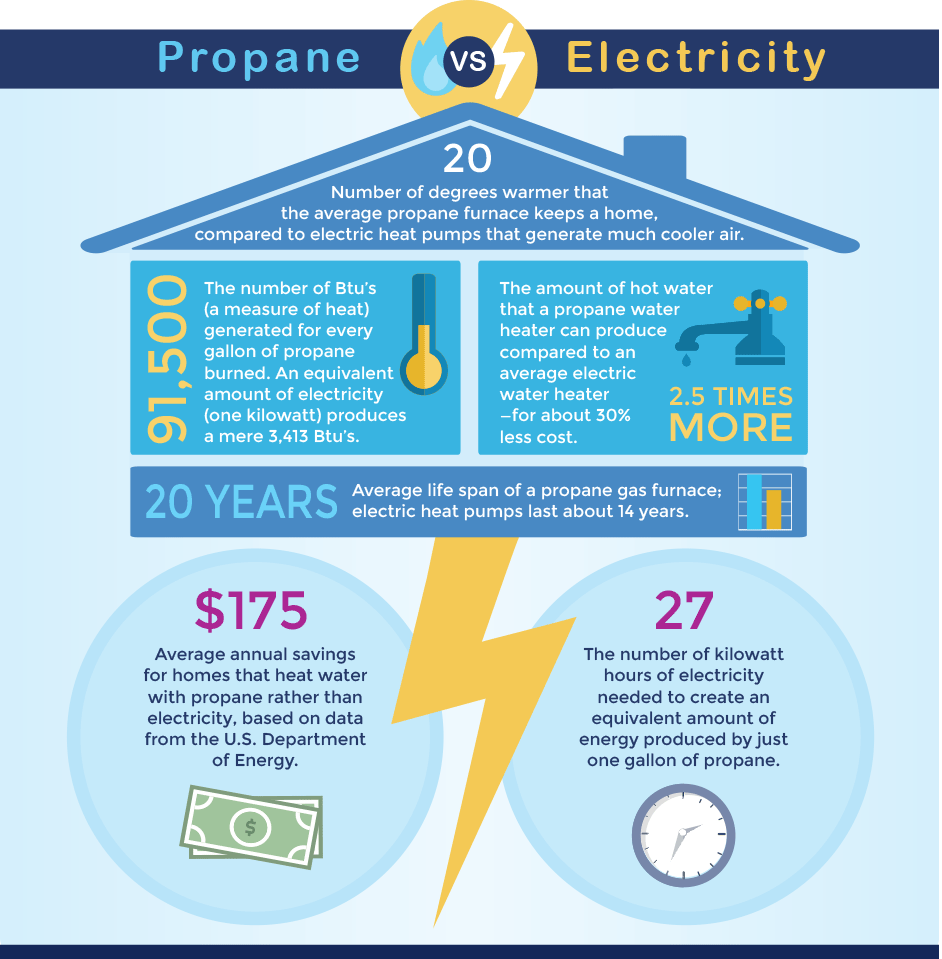As far as efficiency, propane is the hands-down winner compared to electricity. Propane generates more BTUs (BTUs or ‘British thermal units’ are measurements of energy)
than an equivalent amount of electricity, so you need much less propane to produce the same amount of energy.
And, today’s clean-burning propane appliances are far more efficient than their electric counterparts.
While some might say that electricity has no emissions at the point of use, the true tale is much more startling.
According to a study done by the Energy Information Administration on Greenhouse Gas Climate Change,
more than half of the electricity we use in this country is generated at coal-fired plants which produce a whopping 81% of our nation’s CO2 emissions.
Unfortunately, the switch to natural gas as a fuel to produce electricity isn’t a much better alternative.
Although natural gas combustion produces almost 45% fewer carbon dioxide emissions than coal, emits lower levels of nitrogen oxides and particulates,
and produces virtually no sulfur dioxide and mercury emissions, natural gas is composed primarily of methane,
a greenhouse gas far more potent than carbon dioxide when released into the atmosphere.
So, on top of being an environmentally-better fuel, propane gives you far more bang for your energy dollar.
Who wouldn’t rather spend their monthly budget on Pizza Fridays, vacation plans, or a present for mom?

Let’s look at water heaters and furnaces as two examples when comparing efficiency and cost savings:
Water Heaters:
Propane water heaters generally cost 30% less to operate than electric ones—or 60% less if you use a tankless propane water heater.
Propane tankless water heaters produce about 50% fewer carbon emissions than electric water heaters.
Propane water heaters can produce twice as much hot water as electric units—in the same amount of time!
People used to think that the purchase of an electric water heater was far cheaper than a propane water heater,
but because of new stringent efficiency requirements for water heaters—that is no longer the case! And think about how much you’ll save on your monthly energy bills.
Furnaces:
Most high-efficiency propane furnaces feature two-stage gas burners and variable speed motors to deliver all the warm air you need, no matter how cold it gets. That’s why on the coldest Ohio night, families in propane-heated homes are cozy, snug, and much warmer than their friends that rely on electric heat.
With a clean-burning, high-efficiency propane furnace, less than 10% of fuel is wasted in the combustion process. In comparison, only one third of the energy used by a power plant to generate and transmit electricity ever reaches your home!
Want to see for yourself? Check out the
National Heating Energy Cost and Carbon Calculators for both water heaters and furnaces.
Other fun facts about propane’s ability to increase efficiency and reduce costs:
Based on Department of Energy national averages, propane costs less than electricity per BTU.
Electric heat pumps often must be supplemented with electric strip heat, resulting in higher costs and lower efficiency.
Propane clothes dryers do the job in about 3/4ths the time it takes an electric model, resulting in substantial cost savings for the homeowner. On top of that, propane heat is a moist heat which means there is less wear and tear on your clothing.
Cooking with propane is less than half the cost of cooking with electricity,
plus you have precise temperature control and instant on/off control.
96% of professional chefs prefer cooking with gas according to a study done by the Propane Education & Research Council.
A propane gas furnace saves roughly $300 annually compared to an electric furnace.
Propane water heaters save up to $150 annually over electric, and heat 2 ½ times the water with the same amount of energy.
Propane reduces greenhouse gas emissions big-time: 34% fewer CO
2 emissions than its electric counterpart, and 14% fewer CO
2 emissions than fuel oil.
High efficiency propane furnaces are rated up to 97 AFUE (Annual Fuel Utilization Efficiency) and are one of the lowest first-cost systems available; with energy costs significantly reduced compared to standard efficiency units.